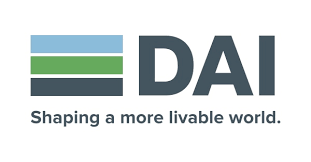Sorry, your search did not match any of our live jobs
We suggest that you:

JOB SUMMARY |
|
| Company | DAI |
| Industry | International... |
| Category | Legal |
| Location | Accra |
| Job Status | Contractor/Co... |
| Salary | GH¢ |
| Education | Post-graduate... |
| Experience | N/A |
| Job Expires | Oct 04, 2023 |
| Contact | ... |
| |
|
|
Company Profile DAI is an employee-owned global development company. For 40 years, we have worked on the frontlines of international development, tackling fundamental social and economic development problems caused by inefficient markets, ineffective governments, and instability. Currently, DAI is delivering results that matter in some 60 countries. Our integrated development solutions turn ideas into impact by bringing together fresh combinations of expertise and innovation across multiple disciplines—crisis mitigation and stability operations, democratic governance and public sector management, agriculture and agribusiness, private sector development and financial services, economics and trade, HIV/AIDS and disease control, water and natural resources management, and energy and climate change. Our clients include international development agencies, international lending institutions, private corporations and philanthropies, and national governments.
Job Description Policy LINK – Drafting Legislation for Regulating the Provision of Climate Information Services
The program aims to do this by investing in and reinforcing productive human and social capital and developing strategic partnerships that help bring these innovations and capacity investments to scale to achieve a critical mass of local actors with the ability and opportunity to effect positive policy change through collective action. Policy LINK’s general approach is grounded in facilitative leadership and collaborative governance, which emphasize engaging stakeholders from civil society and public and private sectors in consensus-oriented decision-making, collaborative problem-solving, and adaptive learning. Policy LINK in Ghana This approach to policymaking will strengthen the capacities of Ghana’s main agricultural policy system actors and institutions and support them to engage stakeholders traditionally excluded from decision- making, including academia, financial institutions, the judiciary, civil society organizations (CSOs), non- governmental Organizations (NGOs), and private sector representatives from the national, regional, and local levels. This approach is underpinned by Policy LINK’s overarching theory of change focused on increasing human and social capital, engaging policy system actors in collaborative processes, and developing mechanisms for collaborative governance and dynamic learning systems and platforms to sustain collective action. Background
Agriculture in Ghana is mainly rainfed and therefore highly susceptible to climate change and variability. For example, delays in the start and early cessation of seasonal rainfall are leading to a high incidence of crop failure, while high-intensity rains and irregular distribution of rainfall within the season have increased the incidence of droughts and floods, which destroy crops and damage infrastructure. To reduce these impacts, Climate Information Services (CIS)2 are needed to support farmers in making climate-smart decisions. CIS provision involves collating, analyzing, packaging, and distributing climate data on variables such as temperature, rainfall, wind, soil moisture, and extreme weather indicators3.
Location-based, CIS, particularly, enables farmers to make informed decisions on the choice of crop, start of planting, need for supplemental irrigation, diseases/pest management, etc.
The Ghana Meteorological Agency (GMet) is the nationally mandated body to produce and deliver CIS. The Agency does so through traditional (e.g., radio, television) and recently through digital media channels (e.g., Twitter). However, in the last two decades, there has been a gradual increase in the number of private companies providing CIS to farmers in the country. Whereas this development opens up competition and ensures that farmers have multiple options in getting value for their money, concerns about the quality of services delivered by these private service providers (e.g., accuracy, appropriateness, etc.), abound, and therefore, the need for regulation to ensure adherence to set standards. Ghana’s National Framework for Climate Services acknowledges the need for regulating the CIS sector. However, there is currently no legal framework for GMet to set enforceable standards for CIS provision and ensure that these standards are adhered to by all players.
Objectives
The overall objective of this consultancy is to develop the appropriate legislation that empowers the GMet to regulate CIS provision in Ghana by setting and ensuring adherence to standards in the CIS sector. Specific objectives are to:
Scope of Work
The consultant will be responsible for the following tasks:
Reporting
The consultant will report to the Climate Change Lead at Policy LINK and the Ag. Director General of the GMet. Regular progress reports and deliverables shall be submitted to the above-mentioned officials.
Deliverables and Level of Effort (LOE)
Below are the deliverables for this engagement and the total Level Of Effort (LOE) is 22days
Deliverables
Required Skills or Experience The ideal consultant should possess the following qualifications and experience:
How To Apply Sorry, job has expired.
Note
Please note, employers receive numerous applications per posting and will only shortlist the most qualified candidates. Also Jobsinghana.com is not involved in any decision made by an employer/recruiter and therefore does not guarantee that applications sent will result in a candidate being shortlisted/selected for that position. | ||||||||||||